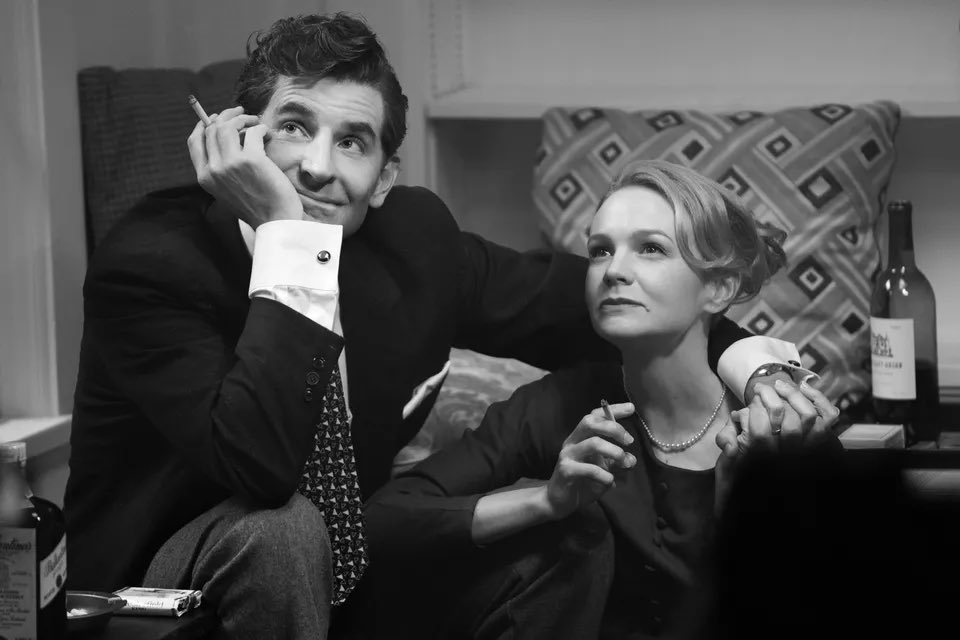There’s only so far one can run before the weight of themselves catches them. In the case of Bradley Cooper’s sophomore directorial feature, “Maestro,” the person in question is Leonard Bernstein (played by Cooper), and his problems range from the effects of fame to confronting his sexuality head-on. In order to run from the things that consume him, Bernstein unforgivingly throws himself into his music.
On Oct. 2, the North American premiere of “Maestro,” at the New York Film Festival (NYFF), was held in David Geffen Hall: a concert hall part of the Lincoln Center for the Performing Arts complex and the home of the New York Philharmonic.
It’s no coincidence that the film’s subject served as a music director here and was named Laureate Conductor of the New York Philharmonic during his lifetime. Seeing “Maestro” in the second home of its subject, enunciated by two of Bernstein’s children sharing words of excitement before the movie, was a great move by NYFF. The setting added an extra note of sentimentality and made the film resonate more than it would have otherwise.
The two-part structure of “Maestro” is unbearably clear-cut. While the 20s of Bernstein’s life and the early stages of his relationship with his wife, Felicia (Carey Mulligan), are in black and white, the life of the aged Bernstein, who has marital and interpersonal problems, is displayed in color.
Though distinct in look, the difference in color grading feels like a mostly surface-level add-on. In the black-and-white portion, Bernstein was allowed the luxury to be his fluid self, both socially and sexually, had not yet faced the critique that comes with celebrity and was praised as the “first great American conductor,” a scene set in the opening of the film, when our protagonist awakens next to a man, leaps out of bed and conducts an orchestra of dreams. Bernstein looks back on this time in a black and white frame: it’s simple, it’s ideal, it’s before.
In the start of the second half of the film, problems start to arise for old “Lenny.” We’re shown, in warm hues of color, an aged Bernstein leaving his wife and kids in the corner of their own home to kiss a young man upstairs. Suddenly, everything is complicated by the intertwined elements of his life, and the tone is set for the rest of the film: Bernstein is torn between exercising his desires, and honoring what he feels his family needs from him.
The two-act structure makes sense, but it doesn’t add anything particularly groundbreaking to the biopic. The audience would have understood the stark difference in our protagonist without Cooper’s impulse to toy around with black-and-white cinematography because of the simple, linear style of storytelling. Bernstein is free as a young person, but problems soon arise; isn’t that how it always goes? But I have to say, if not anything else, the first portion was goofy. The crowd got a kick out of every line Cooper wanted them to.
Possibly the only aspect of the film in which “Maestro” soars above other biopics is how it allows the audience to truly gauge its subject’s love for his craft. It’s not a story we’re told in structures that conveys this, it’s the interspersed scenes of Cooper conducting, with sweat dripping down his forehead and a smile on his face; Bernstein’s love for his craft is infectious. In a scene following a blowout fight between Bernstein and Felicia, she watches him conduct a performance and runs crying into his arms, saying, “You have no hate in your heart.” It’s his passion for music that motivates everything in his life, not just his career, but it’s a reason why Felicia doesn’t end their life together and, as he tells interviewers throughout the film, it’s why he doesn’t end it all. It’s not just noise emitted due to the movements of his hands, the weight of music is Bernstein’s entire reason for being. Cooper translated this element of the subject’s life the best, as both the actor and director.
Not only was it translated well emotionally, but in David Geffen Hall a Dolby Vision projection system and Dolby Atmos sound system had been installed (we were told this had only been finished 36 hours prior to the screening). Hearing the projection of the music during the conducting scenes added to the experience tenfold. It’s one thing to be told you’re watching a portrayal of a musical genius, it’s another to actually hear his music crystal clear.
“Maestro” is good enough, but on the heels of “A Star is Born,” it’s not Cooper’s best film. It’s not even his best film about a musician in an emotionally exhaustive relationship. However, it is his best film that dedicates a scene to Snoopy (count: one).








































































































































































































